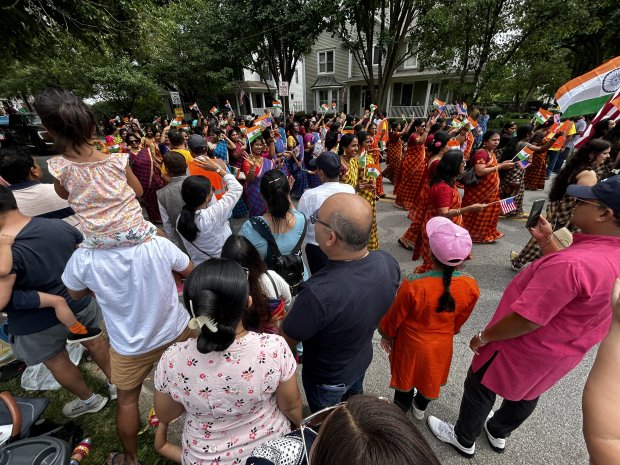At a virtual town hall meeting called by U.S. Rep. Raja Krishnamoorthi, D-Hoffman Estates, Wednesday, a veteran immigration attorney briefly explained President Donald Trump’s immigration-related executive orders issued shortly after he took the oath of office, and told those who could be affected to beware and be prepared.
“Everybody in this country, no matter what you hear on television … is protected 100% by the United States Constitution and has rights,” said attorney David Leopold.
He and the Krishnamoorthi said those rights, however, are being challenged by Trump.
Krishnamoorthi’s office told Pioneer Press that some 800 people were on the roughly 30-minute Zoom video conference call, and some questions had come from that pool. The five-term congressmen representing the 8th District, who pointed to his own status as an immigrant to this country and one of only a few in Congress, also threw in some queries.
“Based on his experience with the public uncertainty around President Trump’s executive orders on immigration in his first term, Congressman Krishnamoorthi wanted to proactively provide updates and information to constituents even before a surge in calls or messages arrived,” Krishnamoorthi’s spokesman Wilson Baldwin stated in an email to Pioneer Press.
The congressman and lawyer team touched on, in particular, Trump’s executive orders that declare a national emergency at the Mexico border, suspend the refugee resettlement program, reinstates from the first Trump administration a “remain in Mexico” policy and denies citizenship status to children born to undocumented immigrants.
One question raised on the call was whether the southern border was being treated differently than the Canadian border. Leopold said there is a stark, disparate difference in attention.
“These executive orders speak specifically to the southern border,” he said. “They’re focused on the migration of individuals from Central America, primarily, coming up and applying for asylum.”
People from Haiti and Cuba are also mentioned in the president’s orders.
Trump took the oath of office Monday, starting his second term as president. Shortly after, he issued a slew of executive orders that covered various issues. They attempt to make good on Trump’s campaign promises to take on such issues as immigration on “Day One.”
With the Mexico border national emergency declaration, Trump has vowed to send troops to the area to address the throngs of people looking to cross into the U.S. – including turning some away and deporting others.
Leopold said on the call that Trump is going to be instituting expedited removals, where deportation could happen without a hearing. That has mostly been practiced right at the border, but, Leopold explained, it has expanded to use all over the country.
Reviving his “remain in Mexico” policy from his first term in office, asylum seekers will have to stay in that country until their immigration cases are adjudicated here in the U.S. Appointments some people had with U.S. Customs and Border Protection regarding asylum were canceled in the wake of the executive action. Then Trump ditched the version of the program from previous the administration.
One Trump order that has already been halted by a federal judge deals with birthright citizenship. In the face of the 14th Amendment that states anyone born on U.S. soil is considered an American citizen, Trump sought to revoke that through an executive order. His order states that children born in this country to undocumented immigrants would not automatically have American citizenship.
A federal judge temporarily blocked that executive order Thursday. Illinois was among the states that sued over that Trump order.
Another Trump executive order put a pause on refugee resettlement for about four months, leading to a reduction or “complete stoppage” of the refugee program, Leopold explained.
While the effort may be antithetical to how the nation was formed and what it has long embraced, he said the president has a right to control how many people flow into the county annually.
Both Krishnamoorthi and Leopold told non-citizens – regardless of immigration status – to be cautious of leaving the U.S. to travel abroad. Reentry, they explained, could be challenging.
“At a minimum, seek the advice of counsel” before going, said Leopold. “We know on a moment’s notice things could change in terms of how people are received when they come back.”
With the first Trump administration, non-citizens and those without a green card had issues returning from overseas travel, they both recalled.
“Their initial visas were almost adjudicated at the airport” by CBP, said Krishnamoorthi.
Leopold cautioned immigrants of any religious, national or ethnic background to be careful traveling.
“Things can change day-to-day,” he said. “It may be too risky for someone to travel – if they’re a green card holder – because the risk of not being allowed back [into the U.S.] just went up.”
They also told people to beware of scammers and other would-be nefarious actors when it comes to people or entities offering immigration assistance.
“Do not make any moves in immigration. Do not file anything with the assistance of anybody who is not an attorney,” said Leopold. “You are responsible even if that person is tricking you or doesn’t know what they are doing.



